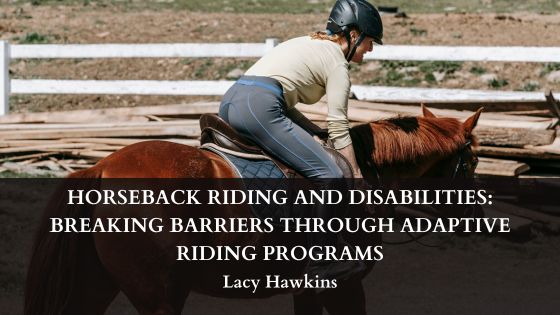Horseback riding has long been recognized for its therapeutic benefits, offering individuals with disabilities a unique opportunity to experience physical, emotional, and cognitive benefits through adaptive riding programs. These programs, also known as therapeutic riding or hippotherapy, utilize horses as a means of therapy, helping individuals with disabilities improve their mobility, balance, coordination, and self-confidence in a supportive and empowering environment.
Primary Benefits
One of the primary benefits of horseback riding for individuals with disabilities is the physical therapy it provides. The horse’s movement stimulates the rider’s muscles, joints, and sensory systems, promoting strength, flexibility, and range of motion. Riders experience the rhythmic motion of the horse’s gait, which mimics the natural movement of walking, helping to improve posture, balance, and coordination. Additionally, riding can help individuals develop core strength and stability, which are essential for activities of daily living.
Psychological Benefits
Moreover, horseback riding offers significant psychological and emotional benefits for individuals with disabilities. The bond between horse and rider is inherently therapeutic, fostering trust, connection, and companionship. Interacting with horses can help individuals build self-esteem, confidence, and social skills by developing relationships with their equine partners and interacting with instructors and volunteers in a supportive and inclusive environment.
A Sense of Freedom
Furthermore, horseback riding provides individuals with disabilities a sense of freedom and independence that may be lacking in other aspects of their lives. Riding allows individuals to experience the thrill of movement and exploration, empowering them to overcome physical and cognitive challenges and achieve a sense of accomplishment. For many riders, the opportunity to ride a horse provides a sense of joy, liberation, and empowerment that transcends their disability.
Adaptive Riding Programs
Adaptive riding programs are tailored to meet each individual rider’s unique needs and abilities, ensuring that all participants can experience the benefits of horseback riding regardless of their physical or cognitive limitations. Trained instructors and volunteers work closely with riders to provide personalized instruction, support, and encouragement, adapting lessons and activities to accommodate each rider’s strengths and challenges.
Cognitive Benefits
In addition to physical and emotional benefits, horseback riding can also have cognitive and sensory benefits for individuals with disabilities. Riding engages multiple sensory systems, including sight, touch, and proprioception, helping to improve sensory integration and processing. Moreover, riding requires riders to focus their attention, problem-solve, and make real-time decisions, which can help improve cognitive function, attention, and executive functioning skills.
A Sense of Inclusion
Furthermore, horseback riding provides individuals with disabilities a sense of inclusion and belonging within the equestrian community. Adaptive riding programs offer a welcoming and supportive environment where riders can connect with peers, share experiences, and celebrate achievements. Riding fosters a sense of camaraderie, teamwork, and mutual support among participants, breaking down barriers and promoting social inclusion and acceptance.
Horseback riding offers individuals with disabilities a transformative and empowering experience, providing physical, emotional, cognitive, and social benefits in a supportive and inclusive environment. Adaptive riding programs help individuals with disabilities break down barriers, build confidence, and achieve their full potential, one ride at a time. Through the power of horseback riding, individuals with disabilities can experience freedom, independence, and joy, enriching their lives and empowering them to thrive.
